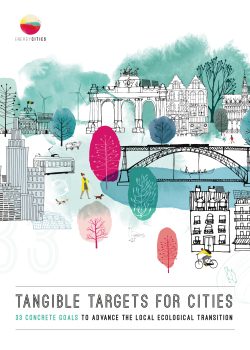Tangible targets for cities
33 concrete goals to advance the local ecological transition

Local governments are on the frontline of the ecological transition and need to set ambitious targets. Citizens’ Assemblies can support them in this process. A Citizens’ Assembly is a deliberative and representative process where randomly selected individuals at national or local level come together to study, discuss and provide recommendations on a complex or contentious issue. Many of these assemblies have been held on climate and biodiversity-related questions. Many times, the measures debated and suggested in these assemblies are much more ambitious than the policies implemented. They also tend to be more concrete and tangible, making them comprehensible and measurable for the general public, which ensures citizens remain a part of the process.
Committing to tangible targets is thus a step we must take to turn cities’ ideas into concrete goals that will get every citizen and stakeholder involved. Inspired by the success of Citizens’ Assemblies around Europe and largely based on their recommendations, we put together a list of 33 tangible targets that can help cities speed up the ecological transition. In addition to Citizens’ Assemblies, we also gathered various measures from city roadmaps and notable practices at both the national and municipal levels that served as sources of inspiration.
This list is not exhaustive but covers the main measures taken in different municipalities and countries across Europe. It’s designed to inspire local governments and for them to choose a set of targets to commit to depending on what is suitable for their cities. They are not expected to reach all targets by 2030; instead they are encouraged to focus on around a dozen goals that can help them make significant steps in the categories most relevant to their territory.
Agriculture and food
- 1 composting opportunity for each citizen
- Reduction of 40% of meat consumption
- x 2 organic agriculture surface area
- 75% of the food is organic or local in the school’s cafeterias
Housing, planning, and urbanism
- 15% of the city surface area is covered by eco-district
- 19°C for heating
- Increase of 30% of high albedo coatings
- 50 collective housing renovations per 1000 units
- 1 m3 additional rainwater recuperation per citizen
- 80 dwellings reclaimed from vacancy per year
Mobility
- 1 bikebus route per school
- 30 km/h default speed limit in urban areas
- 1 meter of bicycle lanes per citizen
- 1 car-free day per month
- 75% of the city center surface is pedestrian
- 100% low emissions public bus fleet
- 1 charging point per 100 citizens
Energy production and consumption
- 100% of the school and public lighting is LED
- 1 cooperative renewable energy project per 500 inhabitants
- 100% of the possible parking is covered by PV panels
- 100% of the public building stock had installed solar collectors
- 5% (maximum) of energy poverty in the city
- 30% of the private building stock are equipped with heat pump, after renovation
Biodiversity
- 1 natural park extra per 1000 citizens
- 100% of the wetlands restored
- 1 tree extra per citizen by 2030
- 0.5 hedged or façade gardens per citizen
Circular economy
- 1 tool library per neighborhood
- 1 local currency per region
- 1 repair café per neighborhood
Awareness-raising and prevention
- 1 efficient communication system to warn citizens in case of climate emergencies
- + 50% environmental and energy awareness among citizens
- 0 advertising board in the public space
